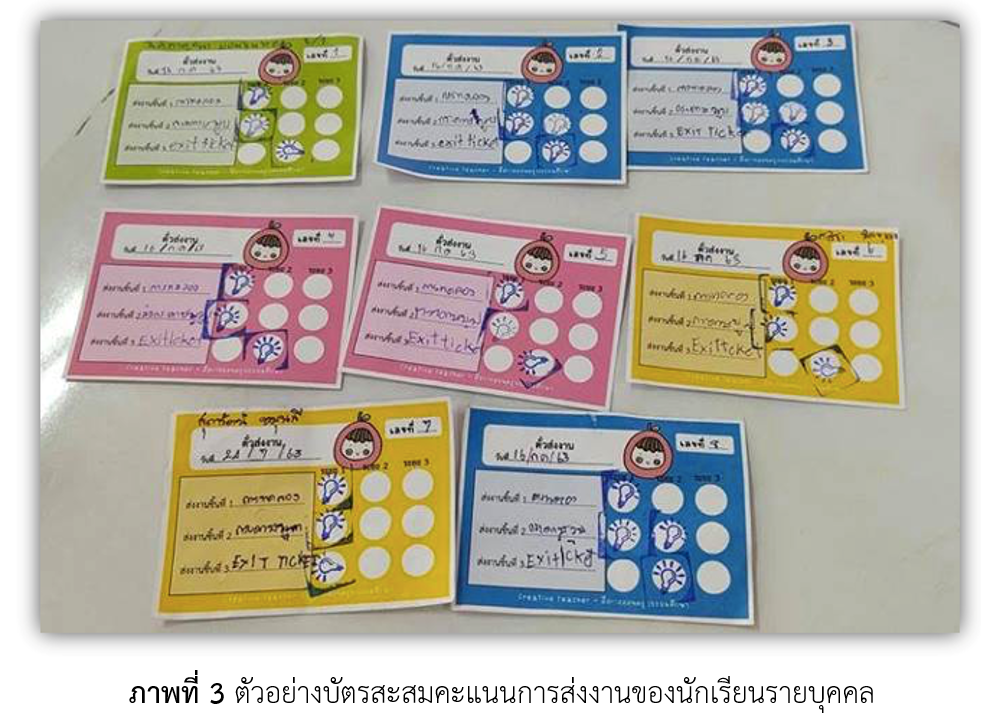การพัฒนาความตรงเวลาของนักเรียนชั้นมัธยมศึกษาปีที่ 5 ในรายวิชาเคมี ด้วยการเรียนรู้แบบผสมผสานการสืบเสาะ สื่อสังคมออนไลน์ ตั๋วออกและบัตรสะสมคะแนน ผ่านการออกแบบบทเรียนโดยใช้กิจกรรมชุมชนแห่งการเรียนรู้ทางวิชาชีพ
Main Article Content
บทคัดย่อ
การศึกษานี้มีวัตถุประสงค์เพื่อพัฒนาความตรงเวลาในรายวิชาเคมีโดยใช้การเรียนรู้แบบผสมผสานการสืบเสาะ สังคมออนไลน์ ตั๋วออก และบัตรสะสมคะแนน ผ่านการออกแบบบทเรียนโดยใช้กิจกรรมชุมชนแห่งการเรียนรู้ทางวิชาชีพ กลุ่มทดลองเป็นนักเรียนชั้นมัธยมศึกษาปีที่ 5 จำนวน 8 และ 12 คน ในโรงเรียนขยายโอกาส จังหวัดนครราชสีมา ภาคการศึกษาที่ 1 ปีการศึกษา 2563 และ 2564 ตามลำดับ งานวิจัยนี้นำการวิจัยเชิงปฏิบัติการในชั้นเรียนใช้สำหรับ PLC 3 วงรอบ เครื่องมือวิจัยประกอบด้วยแผนการเรียนรู้ 3 แผนที่จัดการเรียนแบบในสถานศึกษาและออนไลน์ แบบสังเกตพฤติกรรม ชุดใบงานวางแผนการทดลอง ตั๋วออก บัตรสะสมคะแนน และแบบประเมินพฤติกรรม การวิเคราะห์พฤติกรรมด้านวินัยใช้การวิเคราะห์ทางสถิติด้วยค่าเฉลี่ย ค่าร้อยละ ค่าส่วนเบี่ยงเบนมาตรฐาน และค่าส่วนเบี่ยงเบนมาตรฐานสัมพัทธ์ ผลการวิจัยสรุปได้ ดังนี้ การส่งงานตรงเวลาในภาคการศึกษาที่ 1 ปีการศึกษา 2563 และ 2564 มีนักเรียนที่ส่งงานตรงเวลาคิดเป็นร้อยละ 95.83 และ 63.89 ของนักเรียนทั้งหมด ตามลำดับ ชี้ให้เห็นว่าแผนการเรียนรู้ทั้ง 3 แผน สามารถพัฒนาการส่งงานที่มอบหมายตรงตามกำหนดเวลาได้ อย่างไรก็ตาม ผลของการเรียนรู้ในสถานศึกษาและออนไลน์เพื่อเสริมสร้างวินัยของนักเรียนชี้ให้เห็นว่าการเรียนในสถานศึกษาทำให้มีพฤติกรรมทางวินัยที่ดีกว่า นอกจากนี้ครูยังสามารถพัฒนาการออกแบบบทเรียนผ่านกระบวนการชุมชนการเรียนรู้ทางวิชาชีพได้อีกด้วย
Article Details

อนุญาตภายใต้เงื่อนไข Creative Commons Attribution-NonCommercial-NoDerivatives 4.0 International License.
วารสารวิทยาศาสตร์และวิทยาศาสตร์ศึกษา (JSSE) เป็นผู้ถือลิสิทธิ์บทความทุกบทความที่เผยแพร่ใน JSSE นี้ ทั้งนี้ ผู้เขียนจะต้องส่งแบบโอนลิขสิทธิ์บทความฉบับที่มีรายมือชื่อของผู้เขียนหลักหรือผู้ที่ได้รับมอบอำนาจแทนผู้เขียนทุกนให้กับ JSSE ก่อนที่บทความจะมีการเผยแพร่ผ่านเว็บไซต์ของวารสาร
แบบโอนลิขสิทธิ์บทความ (Copyright Transfer Form)
ทางวารสาร JSSE ได้กำหนดให้มีการกรอกแบบโอนลิขสิทธิ์บทความให้ครบถ้วนและส่งมายังกองบรรณาธิการในข้อมูลเสริม (supplementary data) พร้อมกับนิพนธ์ต้นฉบับ (manuscript) ที่ส่งมาขอรับการตีพิมพ์ ทั้งนี้ ผู้เขียนหลัก (corresponding authors) หรือผู้รับมอบอำนาจ (ในฐานะตัวแทนของผู้เขียนทุกคน) สามารถดำเนินการโอนลิขสิทธิ์บทความแทนผู้เขียนทั้งหมดได้ ซึ่งสามารถอัพโหลดไฟล์บทความต้นฉบับ (Manuscript) และไฟล์แบบโอนลิขสิทธิ์บทความ (Copyright Transfer Form) ในเมนู “Upload Submission” ดังนี้
1. อัพโหลดไฟล์บทความต้นฉบับ (Manuscript) ในเมนูย่อย Article Component > Article Text
2. อัพโหลดไฟล์แบบโอนลิขสิทธิ์บทความ (Copyright Transfer Form) ในเมนูย่อย Article Component > Other
ดาวน์โหลด ไฟล์แบบโอนลิขสิทธิ์บทความ (Copyright Transfer Form)
เอกสารอ้างอิง
Intharaksa, P. (2019). Learning management with social meadia (in Thai). Journal of Education Naresuan University, 21(4), 357-365.
Janhom, P. and Jantrasee, R. (2019). Grade 11 students ’scientific argumentation learned using argument-driven inquiry in chemistry laboratory (in Thai). Walailak Journal of Learning Innovations, 5(1), 21-36.
Koomthanom, N. and Ratana-Ubol, A. (2015). Effect of oraganizing non-formal education activities to enhance self-discipline in youth (in Thai). An Online Journal of Education, 10(4), 562-573.
Pabchanda, S. (2020). The best practices of coach for motivation of motivation of professional learning community by NRRU model (in Thai). Journal of Education, Srinakharinwirot University, 22(1), 1-16.
Pananchai, K. and Supasorn, S. (2020). Development of grade-10 students’ conceptual understanding of ionic compound by using inquiry learning in conjunction with particulate models (in Thai). Journal of Science and Science Education, 3(2), 165-176.
Pananchai, K., Matarat, P., Tamuang, S. and Supasorn, S. (2018). Eleventh grade students’ conceptual understanding and mental models on chemical equilibrium from learning by using inquiry incorporated with predict-observe-explain technique (in Thai). Journal of Science and Science Education, 1(1), 49-60.
Rakkrathok, P. and Sovajassatakul, T. (2020). The developmant of web-based instruction using inquiry-based learning on information management for grade 7 students (in Thai). Journal of Industrial Education, 19(3), 82-90.
Sriwanna, K. and Pabchanda, S. (2021). The development of analytical thinking skill and scientific minds in chemistry of tenth grade student by constructivist and collaborative Learning (in Thai). Journal of Education, Khon Kaen University, 44(2), 97-109.
Tagaew, A. (2021). The development of learning activities packages on elements and compounds by inquiry based learning incorporated with flipped classroom for grade-10 students (in Thai). Journal of Science and Science Education, 4(1), 71-83.
Tipchai, A., Meewong, C., Wuttisela, K. and Supasorn, S. (2019). Grade-10 students’ conceptual understanding of covalent bonding and molecular shapes from inquiry learning by using physical models (in Thai). Journal of Science and Science Education, 2(1), 43-56.
U-Kong, N. (2018). Learning contract: innovation for increasing students’ responsibility for attending class and punctuality in the 400111 Information world course (in Thai). Veridian E-Journal, Silpakorn University, 11(1), 2657-2674.
Yothawaramontri, R.-a., Phoprom, U. and Wongsawat, K. (2013). The effects of applying inquiry cycle and graphic organizer technique entitled chemistry bounding affecting learning achievement, abilities to solve science problems and attitudes toward chemistry for mathayom suksa4 students under the secondary education. Sakon Nakhon Graduate Studies Journal, 10(46), 221-234.
Bunwirat, N. and Boonsathorn, S. (2018). Inquiry-based learning: an effective pedagogical approach for empowering 21st century learners and education 4.0 in Thailand (in Thai). Political Science and Public Adminstration Journal, 9(1), 163-183.
Kaewpila, P. and Thongprong, A. (2021). Teacher’s opinions on delf-descipline of secondary school student in group 6 under the secondary educational service area office 1 (in Thai). Journal of Roi Kaensarn Acdemi, 6(3), 173-184.
Khwanput, K., Chaiprasert, P. and Wannaprapha, T. (2020). A study effect of inquiry-based learning with computer assisted instruction on learning achievement in Chemistry and satisfaction for grade 11 students (in Thai). Narkbhutparitat Journal, 12(2), 160-172.
Pabchanda, S. (2020). Lesson learned in the best practices of mentor for motivation of professional learning community by NRRU model (in Thai). Journal of Educational Administration, Silpakorn University, 11(1), 206-214.
Supkul, K., Sahatsathatsana, C. and Sungsrikaew, P. (2020). The development of flipped classroom learning activities integrated with the facebook of mathematics for grade-8 students (in Thai). Journal of Science and Science Education, 3(2), 125-133.
Tabsee, B. (2009). The enhancement of discipline on the aspect of responsibility for students in grade 7th-9 th: A case study of Bankork Wita (in Thai). Rajabhat Maha Sarakham University Journal, 3(2), 173-183.
Tingsa, C., Jaigla, A., Tamuang, S. and Supasorn, S. (2018). Twelfth grade students’ achievement and problem-solving ability on properties and reactions of organic compounds from learning by using inquiry incorporated with problem-based learning (in Thai). Journal of Science and Science Education, 1(1), 97-108.
Toemngam, D., Ngamprakhon, S. and Saengnont, K. (2019). A study of student discipline strengthening in schools in Bang Yai district, Nonthaburi provincial administrative organization (in Thai). Journal of Educational Review Faculty of Education in MCU, 6(1), 48-58.
Klinkla, R., Phibanchon, S. and Srisanyong, S. (2016 ). The effect of inquiry learning and open approach on stoichiometry chemistry to develop ability in analytical thinking for 11th grade students (in Thai). Journal of Education Naresuan University, 18(1), 211-217.
IPST Chemistry. (2019, May 23). The Institute for the Promotion of Teaching Science and Technology (IPST), Retrieved June 2019, from www.youtube.com


